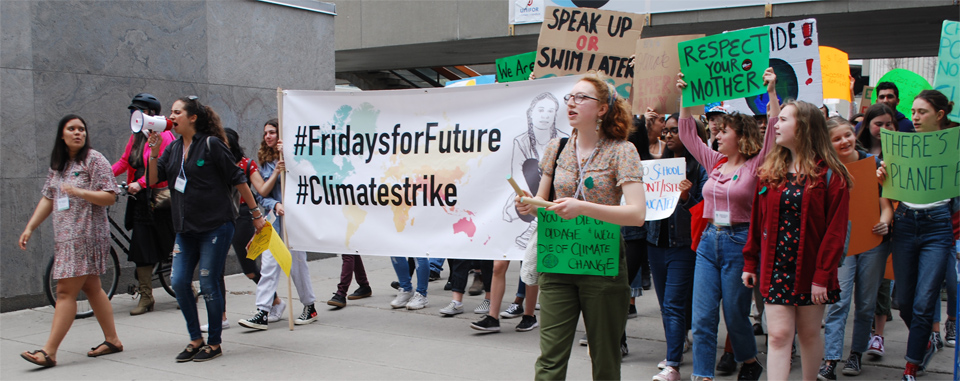
Guest blog by Sarah Erik Sackville-McLauchlan.
One of the most truly hopeful and inspiring things I’ve seen in a long time has been the sudden rise, seemingly out of nowhere, of the youth strikes for climate – operating in many locations (including here in Toronto) under the banner “Fridays For Future”. Started in Sweden by 16-year-old powerhouse Greta Thunberg, it is a movement of young people, middle- and high-school students, who have decided to “go on strike” from school, skipping classes to sit/rally in front of politicians’ offices or legislative buildings in order to demand bold action be taken to address the climate crisis.
Intergenerational injustice – inheriting a dangerous future not of their own making
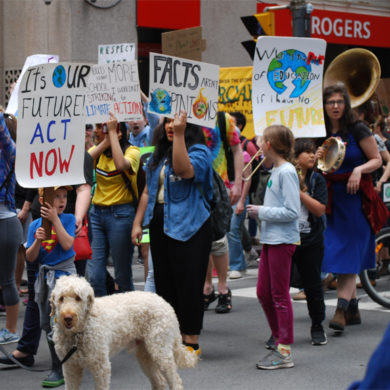 More, they seek to dramatize and call attention to the issue of intergenerational injustice. These young people, and their even younger siblings, are the generations that will be most directly and direly injured by the climate crisis. They are protesting the unfairness of inheriting a dangerous future not of their own making, while many of their elders continue to make matters worse through denial and inaction.
More, they seek to dramatize and call attention to the issue of intergenerational injustice. These young people, and their even younger siblings, are the generations that will be most directly and direly injured by the climate crisis. They are protesting the unfairness of inheriting a dangerous future not of their own making, while many of their elders continue to make matters worse through denial and inaction.
The worst effects of climate change will hit after 2030 when these kids, in middle-school and high-school now, will just be hitting what should be the prime of their lives, their 20s and early 30s. Instead of being able to enjoy life, they will be coping with violent extreme weather, food and water scarcity, increased conflict, or even social collapse and human extinction unless we act to turn this situation around within the next decade. These young people make a powerful moral argument that we will be killing them off in their prime if we continue to burn fossil fuels!
Climate justice intersections
It has also been interesting to watch this movement of young people progess, as York Professor Anders Sandberg puts it:
“. . . from thinking in terms of climate change, that is to say thinking narrowly of emissions reduction as a technical problem, to beginning to think in terms of climate justice; that is, to begin to think systemically about the social, political and economic roots and effects of the climate crisis.”
When I first began attending the Fridays for Future rallies here in Toronto, there seemed to be a somewhat narrow focus on straightforward demands for lower greenhouse gas emissions. But as the movement has grown and developed, it has begun to become more intersectional.
Although there is still a way to go, the young people striking have begun to see and explore the connections between their struggle for intergenerational justice and other areas where the struggle for a shift to a renewable-energy-based, regenerative economy is also a struggle for justice, such as Indigenous rights and sovereignty and the struggles of front/fence-line communities of colour. And this is vastly important!
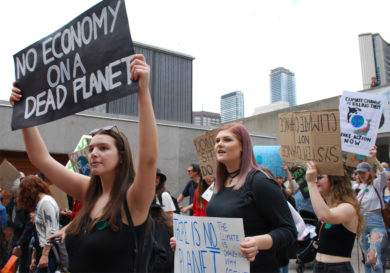 It is so greatly important that this youth movement connect to other struggles because it will need solidarity, and it will need to give solidarity in return, in order to be effective.
It is so greatly important that this youth movement connect to other struggles because it will need solidarity, and it will need to give solidarity in return, in order to be effective.
If it is perceived as a movement of privileged kids from rich countries narrowly demanding GHG reductions, it will remain isolated and be unable to achieve its goals. If the young people are able to connect those intersectional dots, and they seem to be doing this rapidly, their call for intergenerational justice – for young people’s right to have a future – becomes an incredibly powerful addition to and amplification of all the other demands for justice piling up around the climate crisis!
Global Climate Week, September 20th to 27th
Beginning on September 20th, 2019, this movement has called for a “Global Week For Future”. The idea is to begin with a day of world-wide youth strikes on the 20th, and culminate this round of actions in a global general strike for climate on September 27th. There will be various political and educational actions throughout the week in between. This week of learning and demonstrating is intended to coincide with yet another round of climate talks at the UN in New York City which will be taking place at the same time. The hope is to send a message loud and clear that talk without real action is no longer acceptable.
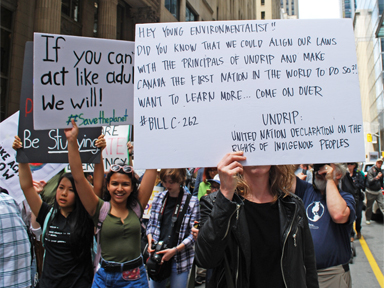 Here in Toronto, our week of action is being jointly organized by the youth strikers and a number of adult ally organizations (ClimateFast, Toronto 350.org, Climate Justice Toronto, Parents For Future to name a few). And although there is still a way to go, I have been impressed and touched to watch the young people rapidly self-educate about the intersection of struggles with the help of adult allies, and to see them endeavour to incorporate that learning into the planning of the week’s events. (Here is the Calendar of Toronto Events.)
Here in Toronto, our week of action is being jointly organized by the youth strikers and a number of adult ally organizations (ClimateFast, Toronto 350.org, Climate Justice Toronto, Parents For Future to name a few). And although there is still a way to go, I have been impressed and touched to watch the young people rapidly self-educate about the intersection of struggles with the help of adult allies, and to see them endeavour to incorporate that learning into the planning of the week’s events. (Here is the Calendar of Toronto Events.)
I am particularly impressed by the joint statement recently released by this coalition, which the People’s Climate Movement has endorsed. It shows just how rapidly this intersectional learning process has progressed and how far it has come. Because, while calling on our nation’s leaders to take bold and immediate action to reduce Canada’s GHG emissions and adapt to a climate-changed world, its recommendations as to how to do so are firmly centred around the needs, knowledge and rights of those most impacted: Indigenous communities, those living on low incomes, migrants and refugees, youth, people of colour, Disabled people/people with Disabilities. This is incredibly heartening to see!
I hope this is the beginning of a much longer, deeper process of intersectional learning and cooperation across the climate movement and beyond It had better be, because, as the slogan of the People’s Climate March back in 2014 put it so well, to change everything we need everyone. And as the anthem of the youth strikes says so beautifully, we need to build a better future and we need to start right now!
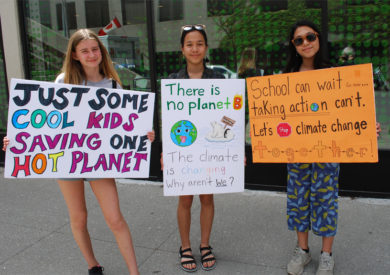
About the author
Sarah Erik Sackville-McLauchlan is currently working on their doctorate in the Faculty of Environmental Studies at York University. They are also an interdisciplinary artist by the name PhantomFemme, including hosting the In This Labyrinth podcast. Their work, both academic and creative, focuses on “outsider” body-minds, and on how the power of the arts can be engaged to create greater social/ecological justice and inclusion.
Follow PCM on Social Media